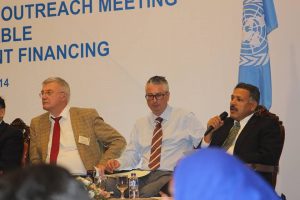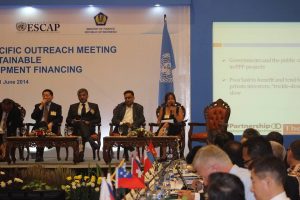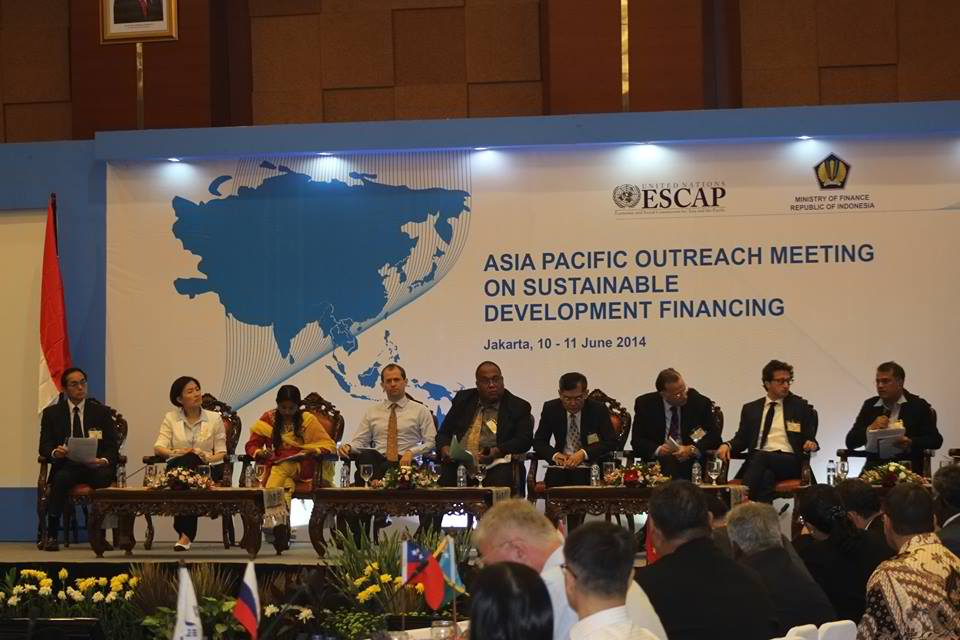Rights-based and people-centered sustainable development financing was the primary message of civil society groups during the Asia Pacific Outreach Meeting on Sustainable Development Financing held last June 10-11 in Jakarta.
The meeting will feed into the on-going efforts of the UN Intergovernmental Committee of Experts on Sustainable Development Financing (ICESDF), established by the UN General Assembly, in follow-up to Rio+20. The Committee is to prepare a report proposing options on an effective Sustainable Development Financing Strategy to facilitate the mobilization of resources and their effective use in achieving sustainable development objectives.
Member organizations of the CSO Partnership for Development Effectiveness (CPDE) and Reality of Aid Network – Asia Pacific (ROA-AP) participated in the meeting and delivered their views on various development financing issues.
 Arjun Karki of LDC Watch, CPDE South Asia focal person, spoke on the issue of South-South, triangular and regional cooperation. Karki decried current regional cooperation efforts pursued largely for trade and investment that prioritize profits and interests of corporate giants rather than of small- and medium-sized enterprises including promotion and protection of people’s rights. He stressed the pivotal role of civil society in ensuring democratic ownership of development, highlighting the need to strengthen collaboration and policy space in terms of planning, coordination and implementation mechanisms.
Arjun Karki of LDC Watch, CPDE South Asia focal person, spoke on the issue of South-South, triangular and regional cooperation. Karki decried current regional cooperation efforts pursued largely for trade and investment that prioritize profits and interests of corporate giants rather than of small- and medium-sized enterprises including promotion and protection of people’s rights. He stressed the pivotal role of civil society in ensuring democratic ownership of development, highlighting the need to strengthen collaboration and policy space in terms of planning, coordination and implementation mechanisms.
Meanwhile, Rezaul Chowdhury of COASTBD, a ROA-AP member organization, reiterated how climate finance should be new and additional to other standing financial commitments of developed country governments: “As climate finance is an obligation of developed countries, it should not be in the form of loans that have to be repaid, and add to the burdens of developing countries. It should not come with conditionalities that infringe on the sovereignty and self-determination of the peoples of developing countries.”
“Sourcing and mobilizing resources for climate finance must be gender just, as grassroots women are particularly vulnerable and thus empowering them in society and the economy must be a vital concern of climate finance,” he further pointed out. “It must be transparent and accountable, meaning revenue-raising mechanisms must allow citizens to see how much money is being generated from what sources, and how enforcement is being undertaken at the national and international levels,” concluded Chowdhury.
 Erin Palomares of ROA-AP also spoke during one of the sessions and expressed civil society’s concern on the increasing push for private sector engagement in development, taking place without proper discussion on regulatory and accountability frameworks. She explained how in most PPP infrastructure projects, the poor are often the last to benefit from increased access and ends up marginalized from basic social services that now increasingly come with a price. She put forth several recommendations which stress the need for pro-poor and human rights indicators to measure the impacts of PPPs.
Erin Palomares of ROA-AP also spoke during one of the sessions and expressed civil society’s concern on the increasing push for private sector engagement in development, taking place without proper discussion on regulatory and accountability frameworks. She explained how in most PPP infrastructure projects, the poor are often the last to benefit from increased access and ends up marginalized from basic social services that now increasingly come with a price. She put forth several recommendations which stress the need for pro-poor and human rights indicators to measure the impacts of PPPs.
“New sources of financing such as PPPs are at best complementary and should not be a substitute for traditional means of implementation keeping the public sector at the center of sustainable development financing”, Palomares pointed out. She concluded by stressing, “the principles of democratic ownership, human rights, transparency and accountability need to be upheld if development financing mechanisms are to contribute to genuine development post-2015.”
The Outreach Meeting was co-hosted by the United Nations ESCAP and Ministry of Finance, Indonesia. It brought key stakeholders from the public, private and civil society from across the region to advance regional perspectives on sustainable development financing strategies and options. The outcome of the meeting is expected to feed into the Report being prepared by the UN ICESDF.

